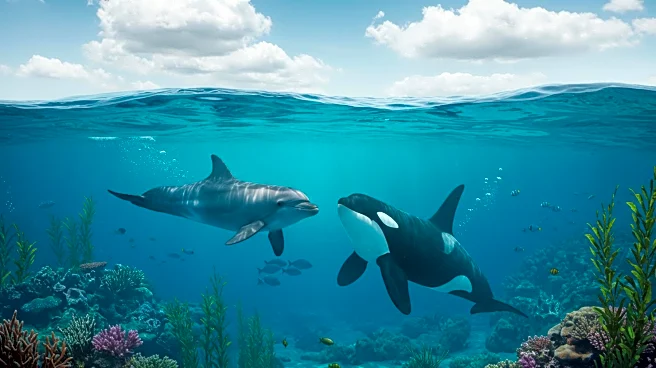What is the story about?
What's Happening?
A recent study published in Proceedings of the Royal Society B has confirmed that dolphins and orcas have reached a point in their evolutionary journey where returning to land is no longer biologically feasible. Led by Bruna Farina, a doctoral researcher at the University of Fribourg in Switzerland, the study analyzed over 5,600 mammal species and found that fully marine mammals are now so specialized for ocean life that re-evolving for terrestrial existence is impossible. This irreversible shift, often referred to as a 'point of no return,' has significant implications for understanding evolution and the future of these species in a changing ocean environment. The study highlights how dolphins and orcas, having adapted to life in the sea over millions of years, are now locked into a narrow evolutionary niche, making them vulnerable to rapid environmental changes.
Why It's Important?
The study's findings underscore the vulnerability of highly specialized species like dolphins and orcas to environmental changes. As these marine mammals are adapted to a specific ecological setup, they lack the flexibility to adjust to new conditions, posing a risk in the face of climate change. Ocean warming, acidification, and declining fish populations could threaten their survival, as they are unable to adapt to different habitats or diets. This research serves as a warning about the risks of evolutionary specialization, highlighting the potential for extinction events during periods of rapid climate fluctuation. The survival of dolphins and orcas is directly linked to the stability of ocean ecosystems, emphasizing the need for conservation efforts to protect these environments.
What's Next?
The study suggests that the future of dolphins and orcas depends on the stability of ocean ecosystems. As climate change continues to impact the oceans, these species may face increasing challenges. Conservation efforts aimed at preserving marine environments and mitigating climate change effects will be crucial in ensuring their survival. Researchers and policymakers may need to focus on strategies that address the specific ecological needs of these specialized species, potentially involving habitat protection and sustainable fishing practices to maintain fish populations. The study calls for increased awareness of the ecological risks posed by evolutionary specialization and the importance of maintaining biodiversity in marine ecosystems.
Beyond the Headlines
The research highlights the broader implications of evolutionary specialization, which can lead to increased vulnerability in changing environments. This concept, known as specialization risk, has historically led to extinction events during periods of rapid climate change. Dolphins and orcas serve as a living example of this risk, demonstrating how evolutionary success in a specific niche can become a liability when conditions shift. The study encourages a reevaluation of conservation priorities, focusing on the preservation of diverse and adaptable ecosystems to safeguard against future environmental changes.














